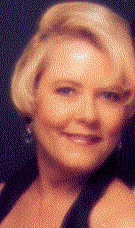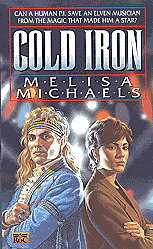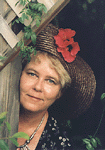Interview With Melisa Michaels
by Claire E. White

|
I understand that your first novel was a mystery novel, then you moved into science fiction, then fantasy. Now you seem to be coming full circle with a new mystery novel in the works. Which genre is your favorite to write in and why?
Actually my first novel was sf: Skirmish, the first of the Skyrider books. In a way you're right, though: the mystery Through the Eyes of the Dead, which was the last novel I sold before the current fantasy novels, was actually written before the Skyrider books. It just took quite a lot longer to sell.
I'm not sure which is my favorite genre to write in: I guess I'd have to say it's whichever one I'm writing in at the time the question is asked. Right now I'm working on another urban fantasy mystery as well as a straight mystery, so I'm feeling pretty friendly toward mysteries. But when I'm working on space adventure, I tend to think it's the best sort to write. Each genre has advantages and disadvantages, strengths and weaknesses. I wouldn't like to have to choose one sort forever, and try to cram all my ideas into it. For example, I never meant to write urban fantasy at all: but when I realized the musicians in Cold Iron had to be elves, and that Rosie herself required a world very like ours to work in, there I was. Elves in our world make it urban fantasy.
What is the most difficult aspect of writing the fantasy novel?
I think that would vary for different writers, and for different stories. In Cold Iron the difficulties were the sort one might encounter in any book: braiding the three levels of the work (Rosie's story, the mystery story, and the metaphorical "elves are like rock stars" story) together gracefully was probably the most challenging aspect.
In the next book, Sister To The Rain, I found the mystery itself to be the most difficult aspect (Rosie is a private investigator, so all her books will be mysteries as well as urban fantasies).
And in the proposal I am writing now for a third book in her world, it's the fantasy aspect that's giving me the most trouble:
| "...[I]f you clean up "real" dialogue to make it perfect grammar and never a repetition or an "um," as though it were narrative, it sounds artificial. You have to find the balance between the two." |
I've dealt with that view of them in each of the first two books about Rosie. It was what prompted me to write about elves in the first place. It may be the most difficult aspect of writing about them. But it is also the most fascinating.
Do you write everyday? What is your schedule for writing?
I try to write every day. For years I wrote ten pages every day without fail; but my career ran into difficulties at the end of the eighties that sent me into a tailspin for a while, and into a severe writer's block that lasted for a couple of years. I'm still getting over that, and haven't yet regained the discipline that kept my production up during the years I was writing the Skyrider books.
For me, a rigid schedule of writing a least a few pages every single day is best. One day off leads to two days off, and all too soon that turns into a week or a month off. It's easiest for me to insist on writing a certain amount every day. Now I just write fewer pages each day than I used to.
Do you use detailed outlines?
That depends on the book, although I never work with a really detailed outline. I really prefer to work without any outline at all; but to sell a book you need to show the editor you know how it's going to come out, so for books I hope to sell before they're written, I write the first three or four chapters and a synopsis of the rest. It's usually thirty or forty pages long and covers only the major scenes.
Do you create character profiles before you begin to write?
Sometimes I do. More often I write an opening chapter in which I find out who the characters are, and write down what I've learned so I can refer to it during the rest of the novel. I don't always use that first chapter. Sometimes it doesn't belong at the beginning of the book, and sometimes it just isn't fit to use at all. But writing it is the most comfortable way for me to find out who the characters are that I'm writing about.
In your latest novel, Cold Iron, your heroine Rose Lavine is a tough (on the outside, at least!) private investigator who deals with some of her own demons while working on the case. How did you create the character?
In her very earliest incarnation, Rose was actually a guy. That may explain why she's so tough on the outside. But obviously, for the plot of Cold Iron, I needed a woman, so I just changed her name and a few minor details to turn her into a woman.
Is there anything of Melisa Michaels in Rose Lavine?

|
They're all fiction, but they're essentially who I would be if I'd been born them. In order to understand how a character feels, thinks, and behaves, I need to find the part of myself that could feel, think, or behave in that way. We all think whatever we're doing is reasonable: otherwise we wouldn't do it. And we all have many facets to our personalities, and many suppressed and even unrecognized urges and inclinations that don't show in our daily lives. To write convincing characters (including villains!), I find I need to look at those hidden parts of myself, and examine the urges and inclinations I ordinarily suppress, in order to identify with the person who lets those out and suppresses different ones. Then I can find the reasoning or emotions that let him or her perform actions I never would.
The Elven rock stars Jorandel and Jim are not the cuddly, cute little elves we are used to! How did you create the characters of Jorandel and Jim?
I had written a mystery novel with ordinary rock stars, and then found one can't sell a mystery novel about rock stars. For a couple of years I looked everywhere for some alternative career for Jim and Jorie that would allow them to behave in the same way, and I couldn't find it.
At the same time I was researching Celtic mythology for another project, and I kept coming across the line about fallen angels that I've quoted above. "Every charm but conscience" sounded exactly like the rock stars I'd written, and very unlike the cute and kindly elves I was accustomed to seeing in fantasy. I wanted more and more to write a book about those elves, the sociopathic ones, who might be cute and even occasionally kindly, but who were deadly dangerous underneath the charm.
Eventually I realized I could do it by rewriting the rock star mystery, inserting the "elves are like rock stars" metaphor and putting the book into a genre that doesn't forbid rock musicians. In the process it became a much better book, as well.
How much research was involved in writing Cold Iron?
More than necessary. I always research more than necessary. I read every book the local library had on Celtic mythology, and bought at least half a dozen of my own. In the end I didn't need nearly so much information about Celtic elves; but it's coming in handy for subsequent books.
I did less research specifically for the music scene; I'd been involved in that back at the dawn of prehistory when I fancied I might like to be a rock star myself, so all I had to do was read enough books and magazines and talk to enough musicians to become aware of what had changed in the field since I was in it. It seemed that less had changed than had remained the same, so I felt comfortable going with what I knew with just a few changes to accommodate more modern styles.
Will we see Rose Lavine again in another book?
Yes, I've just turned in a second book about her called Sister to the Rain, which takes place in a California artists' colony infested with elves and halflings. (Actually those are some of the residents. Rose is hired to investigate a haunting presence that steals small objects and frightens the children.) Now I'm writing a proposal for a third in which she'll get back together with one of the characters from Cold Iron.
Will we get to learn more about the Faerie and the Elvish element of the world that you dropped tantalizing hints about in Cold Iron?
There's more of it in Sister than in Cold Iron, and there will be more still in the third book (if I get to write that one).
One of Cold Iron's great strengths is its believable and natural use of dialogue. What are your tips for writing believable dialogue?
Write what you might say or hear a friend say.
| "There's no reason to pay reading fees, or book doctors, or that sort of thing, when you can get all the help you need for free." |
Many writers find it useful to read their dialogue aloud. Phrases that don't look like tongue-tanglers sometimes turn out to be when you try to say them. Sentences that looked natural at first glance sound like grade B movie dialogue when spoken aloud. It's a useful tool to help you get an ear for natural dialogue--and to help you find the hidden tongue-tanglers, as well.
What types of fiction do you like to read to relax?
Science fiction, mysteries, and romances, especially Georgette Heyer's Regency romances (I've read them all repeatedly). I seldom read fantasy, since kindly elves and ultimate struggles between Good and Evil tend to bore me; but I've very much enjoyed some recent urban fantasy, and some of the retold fairy tales such as Patricia McKillip's Winter Rose.
How did you first get published?
I just kept sending short stories to editors till one of them bought one. Actually there's a funny story about that; I was so accustomed to rejections that I threw away my first acceptance unopened. It was addressed to me, and had "Davis Publications" in the return address corner, and wasn't a big enough envelope to have my rejected manuscript in it. I thought it was just some magazine wanting me to subscribe.
Some hours later, for some reason, I suddenly wondered what "Davis Publication" would be wanting me to subscribe (it somehow had not come to my attention that Isaac Asimov's SF Magazine was a Davis publication). It seemed odd, too, that they would send such a plain-looking envelope instead of a snazzy brochure of some sort. Luckily I hadn't yet carried out the garbage, so I was able to dig out the envelope containing my first fiction contract. (I've been more careful what I throw away unopened since then.)
You are also the webmaster for the Science Fiction and Fantasy Writers of America (the "SFWA"). What are your duties as webmaster?
I'm making up the Webmaster job as I go along. In '95 when a SFWA member offered us Web space if someone else would design and maintain the page, I was the only volunteer. At that time I had only designed my own home page a month or two earlier, and that was the extent of my Web experience.
I learned fast. At first I thought it would just involve designing an attractive way to put information about SFWA on the Web, but the job grew as I went along. Now there's information about SFWA, about writing, about the sf/f field in general, press releases, a long list of links to useful Web resources for writers, an art gallery, and more. Unofficially, I've become SFWA's "Internet Regional Director," supplying whatever information I can that people write to ask for, as well as trying to keep the Web site up to date. And I'm always on the lookout for more articles to publish about writing.
Should female webmasters be called "webmistresses" :)?
I know Webmasters who call themselves "Webmistresses." I think if I had to have a gender-specific title I'd rather be called "Web Goddess." :-)
What is the SFWA Bulletin? Can anyone subscribe?
The Bulletin, is SFWA's quarterly magazine, loaded with information, insights, and insider news on fantasy and science fiction. We have market reports, articles on both the business and the craft of writing, a column on science and one on the writing life, and much more. And you don't have to be a member to subscribe. There's a subscription form and more information, including back issues available for sale, at http://www.sfwa.org/bulletin/. (I'm the Bulletin's market director and Webmaster as well.)
Now that OMNI Magaizine is totally online and the quality of web-only magazines is improving, do you think that in the future SFWA will allow publication in an online publication to count for SFWA membership requirements?
Yes, we're working on it. Just as there are limitations on which print publications are considered "professional," there will be limitations on which electronic publications are considered "professional." Arriving at satisfactory guidelines and getting membership approval will take time. When a decision is reached, it will be reported on the SFWA site.
It seems that there are a lot of scams online and offline trying to take money from aspiring writers. What do you advise beginners about paying an agent's fee, paying to get published etc.?
Money should always flow toward the author, not away. This is a business, like any other: the auto mechanic doesn't pay you to let him fix your car. The artist doesn't pay you to take his painting into your home. If you mean to become a professional writer, you should not pay someone to publish your work.
An agent gets paid from the proceeds of sales made. I would be suspicious of any agent who asks for any other money than that.
Some will take expenses as well as a percentage of the money from a sale. That's something that should be discussed in front, of course; but if it's acceptable to the author, that's fine. But there should be no charges whatsoever before a sale has been made.
There's no reason to pay reading fees, or book doctors, or that sort of thing, when you can get all the help you need for free. If you can't find a workshop in your area, you might try the online ones listed at http://www.sfwa.org/links/workshops.htm, or look for one conducted by street mail (there's at least one of those listed at the above URL as well).
How important is it for authors to be online?
It's by no means crucial -- there are many, many working writers who are not online -- but I find it incredibly useful. The Web is invaluable for research. Usenet is a great place to meet fans and to find experts in various fields to answer specific research questions. I keep in touch with both my editor and my agent by email. Short story writers have told me they get many of their invitations to write for anthologies from online contacts.
Probably the thing I like most about it is getting to hear from and talk with fans of my work. When I was writing the Skyrider books I had no computer and had never been online, so as far as I knew, the five or six people over the years who bothered to write me street mail about them were the only people in the world who had read those books. In the month since Cold Iron was released, I've heard from dozens of people who've read it. I've heard comments and suggestions that will be useful in writing more books. And best of all, I've made some great friends.
Can you tell us about your future projects?
I guess I already mentioned above that I'm working on another Rosie Lavine proposal. This one will, I think, be a more straightforward murder mystery, but it also has stronger fantasy elements than the first two. Rose may even have to go to Faerie to solve the mystery.
My sister and I are collaborating on a murder mystery about two older women, sisters, who live together in northern California. We hope eventually to make it the first book of a series about the sisters, but the work is going slowly since it's her first novel and I'm a little overextended with my volunteer work for SFWA, my own work, and the slow remodeling of the house my husband and I bought a couple of years ago. (We're doing all the work ourselves, so naturally it's ended up taking a bit longer than we expected.)

|
I would like eventually to write more space adventure like the Skyrider series; and I have a fantasy I want to write that doesn't take place in Rosie's world, though it is also an urban fantasy. But what I'll get to do will depend in large part on how well Cold Iron sells, so right now I'm pretty busy holding my breath. |
Return to the October 1997 issue of The IWJ.
More from Writers Write
